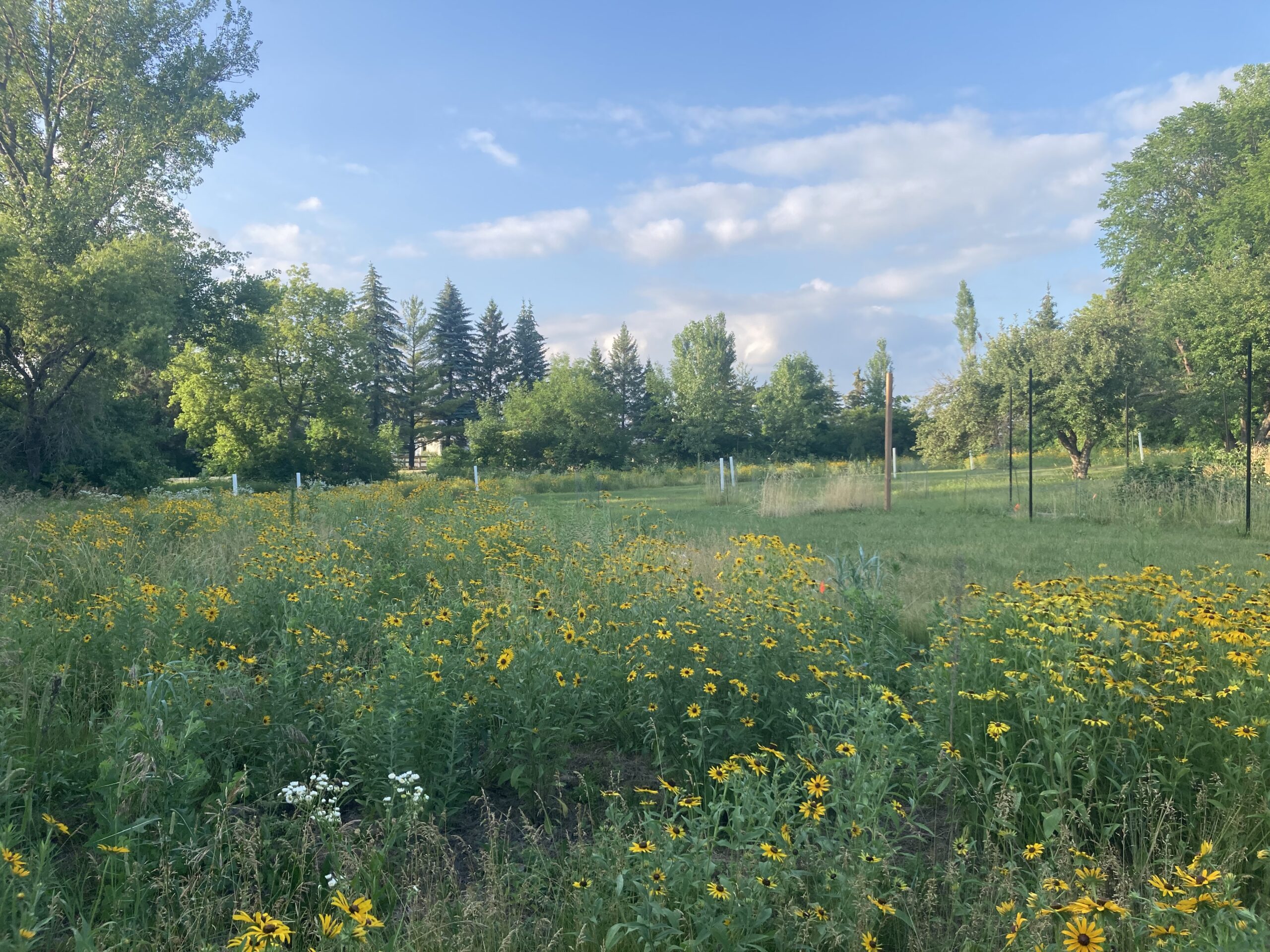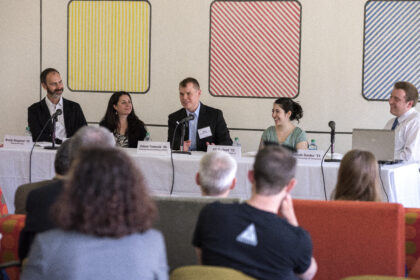‘I feel like I have been given a second chance’

“I have a renewed focus on being honest in everything I do, including being honest with myself.”
Adam Tomczik ’06, M.A. ’07, was consumed by depression. He stopped making plans and dreaming about the future.
He felt hopeless.
“It was one miserable day at a time,” he recalls. “Like being in a deep dark hole, unable to climb out.”
When protests spilled out onto city streets in the aftermath of George Floyd’s murder, Tomczik was in the thick of it. He and his family lived in the Minneapolis neighborhood near the murder scene and watched as their familiar surroundings, including the local police station and area businesses, were looted, vandalized, and burned to the ground.
“We were ground zero for the riots; it was an extremely traumatic experience,” Tomczik says. “Our neighborhood was substantially destroyed.”
Tomczik’s resulting depression and Post Traumatic Stress Disorder symptoms were exacerbated by the stress and isolation of the pandemic, an experience shared by many others across the world. As the months wore on, he drank heavily.
Tomczik was running out of options to ease the pain of depression and PTSD. Facing what felt like insurmountable odds, he finally found some relief in January 2023 in the form of ketamine-assisted psychotherapy.
Ketamine, an anesthetic with some psychedelic effects, is administered in Tomczik’s native Minnesota as an off-label treatment for diagnoses including depression, anxiety, and PTSD. The 10-session regimen administered by a doctor who studied ketamine therapy in the U.S. and the Netherlands helped him quit drinking, develop healthier habits, and view life with a more positive outlook.
“I feel like I have a renewed lease on life and have been given a second chance,” he says.
***

Though the relief was palpable, Tomczik was bothered by one statement from his doctor. She told him that for his combination of depression, PTSD, and alcohol use, the most ideal treatment would be psilocybin, a treatment that is illegal in Minnesota. As a criminal prosecutor in Hennepin County, Tomczik would have been at risk of losing his job and license to practice law if he’d pursued a psilocybin option. A chemical produced by more than 100 species of mushrooms, psilocybin is becoming an increasingly common treatment for mental health ailments. Its psychedelic effect has earned it the nickname “magic mushrooms.”
“There are people who probably can’t even pronounce psilocybin or know what it is aside from ‘magic mushrooms.’ But it can make a difference in people’s lives,” says Tomczik. “Existing research shows that it’s a very effective tool.”
When he learned that the state was searching for residents to serve on a Psychedelic Medicine Task Force, Tomczik saw an opportunity. Today, he is one of several people, including two veterans, with treatment-resistant mental health conditions appointed to the task force by Gov. Tim Walz. Other members include health professionals with experience in psychology, psychiatry, integrative medicine, and the medical use of psychedelic medicine; and a person with expertise in the treatment of substance use disorders.
The task force was established during the 2023 legislative session to advise the legislature on the legal, medical, and policy issues associated with the possible legalization of psychedelic medicine in Minnesota, specifically psilocybin, MDMA, and LSD.
“I look forward to learning. I’m approaching it with humility,” says Tomczik. “I don’t have all the answers, but my bottom line is that I want to make psychedelic medicine accessible to as many people as possible.”
The task force held its first meeting on Nov. 6, 2023, and will be active throughout 2024. Members will serve until Jan. 1, 2025. Tomczik’s appointment to the task force and experience with ketamine infusions were featured in a New York Times article about Minneapolis Mayor Jacob Frey’s executive order making the enforcement of psychedelic drug laws a low priority for city police officers.
***
Tomczik went into ketamine treatment thinking that in the best-case scenario, it would help him cut back on drinking.
“The way ketamine works — and, as I understand it, the way psilocybin works — is that roughly 5 to 14 days after a session, your brain and your body have increased neuroplasticity, which means it’s easier to make new good habits and end negative habits than it would have been without the treatment,” Tomczik explains.
After six sessions, he quit drinking entirely, something he never imagined possible. He also gained a fresh perspective on life, particularly his appreciation for fatherhood.
“I have two little boys ages 7 and 4, and the idea that they’re the most important part of my life is something I feel on a deeper level now than I had before,” he says. “I have a renewed focus on being honest in everything I do, including being honest with myself.”

Tomczik, a first-generation college student, received a bachelor’s and master’s degree at Clark in history. As an Anton-Steinbrecher fellow, Tomczik immersed himself in Jack Kerouac’s novels and poetry and retraced the author’s journey from Lowell, Mass., to San Francisco, documenting how the country had changed during the intervening decades.
Tomczik came to regard the History Department “like family.” He was inspired by Professor Doug Little, who was dean of the college at the time, as well as by professors Amy Richter and Drew McCoy, who helped him publish his master’s thesis analyzing lumberjack work culture in Maine and Minnesota from 1840 to 1940. Little and McCoy retired this past spring.
The late Professor Paul Ropp’s teaching also made an impact. Tomczik enjoyed Ropp’s Asian history classes, an experience that later helped motivate Tomczik and his wife to live in Taiwan for a year, where they taught English to children. With a natural affinity for history, Tomczik has spent significant time researching psilocybin use.
The potential benefits of hallucinogens and psychedelics were studied in the 1950s and 60s, but clinical studies ceased following the passage of the Controlled Substance Act of 1970. Scientists resumed research in the 2000s when a group of Johns Hopkins researchers received approval. A study by Johns Hopkins Medicine researchers published in the Journal of Psychopharmacology in 2022 found that psilocybin-assisted therapy accompanied by psychotherapy can provide substantial antidepressant effects that could last at least a year for some patients.
“My life has changed for the better immeasurably.”
Tomczik and fellow task force members are charged with developing a comprehensive plan regarding the statutory changes necessary to legalize psychedelic medicine; studying policies and regulations focused on retaining state autonomy; and devising strategies to educate the public about legalized psychedelic medicine.
The Centers for Disease Control and Prevention report that more than 1 in 5 adults live with a mental illness. Young adults experienced the highest levels of mental distress during the pandemic, with 58 percent reporting symptoms in Pew Research Center surveys from March 2020 to September 2022. Forty-four percent of people 30 to 49 — the bracket that includes 40-year-old Tomczik — reported high psychological distress.
“A very large percentage of Americans, of Minnesotans, are struggling with depression, anxiety, or substance use issues,” says Tomczik. “Especially in my profession.
“As an attorney, and specifically as an attorney who practices in the criminal justice and juvenile justice worlds, I assume that most of my co-workers are dealing with depression or anxiety,” he adds. “I don’t know how you couldn’t, given the subject matter of our work and the time pressures on us, as well as the experience of litigating and having an opposing counsel test all of your evidence.”

Unsure whether their neighborhood would rebuild, Tomczik and his family have moved to the Minneapolis suburbs. Tomczik planted more than 500 trees in his new yard, built a fenced-in vegetable and berry garden, and converted more than a third of his property from turf grass to native grasses and wildflowers. He feels at peace, which allows him to focus on helping people in meaningful ways — both as a prosecutor and as one of the guiding hands of the Psychedelic Medicine Task Force.
“My life has changed for the better immeasurably with ketamine,” he says, “and my hope is that we can have more tools in our toolbox to improve people’s lives and well-being and make society better.”


